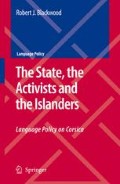The Third Republic and a New Century
The Second Empire collapsed at the end of the Franco-Prussian War with the capture of Napoleon III at Sedan and, with its fall and the creation of the Third Republic in 1871, France embraced the ideals of Republicanism once more. The new government’s drive for linguistic and political assimilation across France was a renewed attempt to bind the nation together and to reaffirm the Republican values espoused by the State. Measures were introduced whose effects were initially felt on the mainland and subsequently on Corsica. Within the parameters of language policy on Corsica, the period covered by the Third Republic saw the climax of the model of French language management as outlined thus far. Having, over the course of the nineteenth century, successfully challenged Tuscan Italian for supremacy within the island’s diglossia, the new regime oversaw the widespread start of a language shift from Corsican to French as the home language on the island. Despite attempts to resist the supremacy of French, the national language reached all corners of the Republic. This period can be viewed as the culmination of the ‘French and French alone’ language ideology, although it is important not to overlook extra-linguistic factors which enhanced the position and status of the national standard: the birth of the new Republic coincided with the acceleration of industrialisation and the on-going modernisation of western Europe, both key factors in language shifts across the continent. We shall examine the mechanisms employed and exploited by the most dominant agent in language policy in France – the State – and demonstrate how these devices changed both language beliefs and language practices on Corsica. This chapter characterises the final elements of the contextualisation of a sea change in the dynamics in language policy on Corsica which took place during the second half of the twentieth century. At the same time, this chapter will seek to demonstrate how Corsica’s unique position and history within the French Republic played a significant part in the language practices of the islanders. In outlining what we know of language beliefs during the Third Republic, we shall recognise the significant developments which served to fashion the islanders’ – and, in particular, the language activists’ – response during the latter part of the twentieth century.
Access this chapter
Tax calculation will be finalised at checkout
Purchases are for personal use only
Preview
Unable to display preview. Download preview PDF.
Rights and permissions
Copyright information
© 2008 Springer Science + Business Media B.V
About this chapter
Cite this chapter
(2008). Chapter 3. In: The State, the Activists and the Islanders. Language Policy, vol 8. Springer, Dordrecht. https://doi.org/10.1007/978-1-4020-8385-3_3
Download citation
DOI: https://doi.org/10.1007/978-1-4020-8385-3_3
Publisher Name: Springer, Dordrecht
Print ISBN: 978-1-4020-8384-6
Online ISBN: 978-1-4020-8385-3
eBook Packages: Humanities, Social Sciences and LawSocial Sciences (R0)

